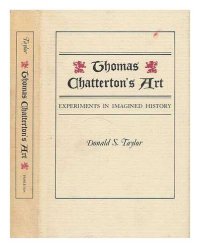
Ebook: Thomas Chatterton’s Art: Experiments in Imagined History
Author: Donald S. Taylor
- Tags: Criticism & Theory, History & Criticism, Literature & Fiction, Movements & Periods, Ancient & Classical, Arthurian Romance, Beat Generation, Feminist, Gothic & Romantic, LGBT, Medieval, Modern, Modernism, Postmodernism, Renaissance, Shakespeare, Surrealism, Victorian, History & Criticism, Literature & Fiction, Poetry, Genres & Styles, History & Criticism, Literature & Fiction, British & Irish, European, Regional & Cultural, Poetry, Literature & Fiction, English Literature, Literature, Humanities, New Used & Rental Textbooks, S
- Series: Princeton Legacy Library
- Year: 1979
- Publisher: Princeton University Press
- Language: English
- pdf
Thomas Chatterton's fabrications--or "forgeries"--of historical poems ostensibly written from the thirteenth through the fifteenth centuries have attracted a great deal of attention and discussion of their authenticity since the eighteenth century. Nevertheless, his works have never before been the subject of a sustained serious and critical investigation that focused on his artistic achievement rather than on the legend and myth surrounding his melodramatic life. Donald Taylor's study provides a thorough analysis of Chatterton's poems and to place them in the context of the poetic and literary traditions that influenced him.
Setting his analyses within the contexts of "historic," heroic, satiric, pastoral, and descriptive modes, the author considers each of Chatterton's major works as solutions to the literary problems the poet set for himself, thus tracing the literary history of Chatterton's artistic development as a sequence of subjects and literary modes explored.
As Professor Taylor amply demonstrates, Thomas Chatterton's brief career embodies important features of the literary transition from the Augustans to the Romantics and, contrary to traditional assumptions, shows that the historical worlds Chatterton imagined have close ties to the century and sensibility against which he is assumed to have rebelled.